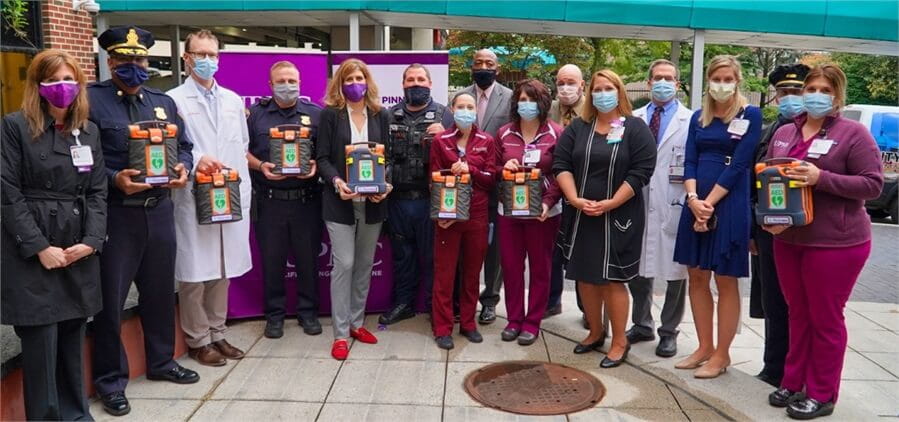
10/13/2020
HARRISBURG, Pa. – UPMC in partnership with The Peyton Walker Foundation (PWF) donated 18 AEDs, automated external defibrillators, to the Harrisburg Police Bureau in recognition of Sudden Cardiac Arrest Awareness (SCA) Month. UPMC and PWF presented the donation to Mayor Eric Papenfuse and the Harrisburg City Police today.
Valued at approximately $40,500, the life-saving donation is possible from proceeds from the 3.2 To Protect the Blue 5K hosted last September by UPMC nurses. Working with The Peyton Walker Foundation, The UPMC Pinnacle Foundation matched event proceeds to support the purchase of the AEDs as well as ensure the future required equipment maintenance. The AEDs were purchased through The Peyton Walker Foundation, who will also spearhead training for officers.
SCA is the cause of more than 350,000 deaths every year. However, proper prevention and bystander response, including police intervention, often saves lives. Emergency Department (ED) nurses at UPMC Pinnacle Harrisburg host the annual 3.2 to Protect the Blue 5K to support local law enforcement.
“UPMC Pinnacle Harrisburg Emergency Department nurses know the best way to improve chances of survival for victims of sudden cardiac arrest is early defibrillation,” said Kathy Hogan Flinn, director of emergency nursing, UPMC Pinnacle. “When they learned that the Harrisburg City Police only had two AEDs for the entire department, our nurses chose to direct proceeds from 3.2 To Protect the Blue 5K to ensure our fellow first responders had the equipment needed to provide timely life-saving care in an emergency.”
AEDs are important because they strengthen the Chain of Survival. They can restore a normal heart rhythm in victims of Sudden Cardiac Arrest. New, portable AEDs enable more people to respond to a medical emergency that requires defibrillation. As police are often first on the scene in an emergency, this provides them with critical equipment to help save a life.
“Providing this life-saving equipment will undoubtedly have a tremendous impact on the people who live here, work here, and visit here. Having quick access to an AED can mean the difference between life and death during a cardiac arrest. Police officers will now have the necessary equipment to initiate life-saving efforts before EMS arrives. Every minute counts when dealing with cardiac arrest. We’re so thankful to our partners at UPMC, and all of the dedicated ED nurses for making this happen, ” said Julie Walker, Peyton’s Mom and executive director of The Peyton Walker Foundation.
About Sudden Cardiac Arrest and AED Intervention:
- The majority of out-of-hospital Cardiac Arrests (OHCA) occurs at public settings (18.8%) and mostly homes/residences (69.5%).
- People are more likely to survive a cardiac arrest if a bystander uses a defibrillator while waiting for emergency medical services to arrive.
- Quickly shocking the heart with an AED can save a person’s life during a cardiac arrest. Experts estimate that each year more than 18,000 Americans have a shockable cardiac arrest outside of a hospital that occurs in public with witnesses.
- Currently, about 9 in 10 people who have cardiac arrest outside the hospital die. But CPR can help improve those odds. If it is performed in the first few minutes of cardiac arrest, CPR can double or triple a person's chance of survival.
Facts about Sudden Cardiac Arrest (SCA):
- SCA is one of the leading causes of death in the U.S. (over 600,000 annually).
- SCA is the #1 killer of student athletes in the U.S.
- Every hour, every day, a student dies from SCA. The majority of those deaths are attributed to detectable and treatable heart conditions that went undiagnosed due to the limited scope of standard sports physicals and well-child check-ups.
- SCA is the leading cause of death on school campuses.
- Survival rates of SCA are less than 10%.
- Some warning symptoms that can lead to SCA include dizziness, fainting, shortness of breath, chest pain, lightheadedness, and passing out. The first symptom of SCA is often sudden death. However, the use of AEDs and CPR increase the chances of surviving an SCA event.

















